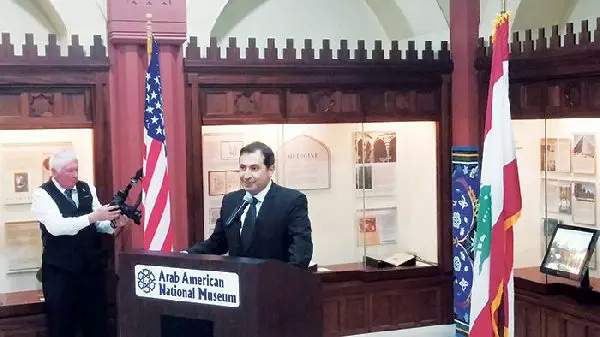
|
| Lebanese Consul General to Detroit Bilal Kabalan. |
DEARBORN — Lebanon’s gloomy political climate did not stop Lebanese Americans from celebrating their homeland’s 71st Independence Day. More than 100 prominent community members gathered at The Arab American National Museum on Monday and shared food and conversations in observance of the occasion.
In fact, Dearborn celebrated the Lebanese national holiday in a greater capacity than Beirut, after the Lebanese prime minister cancelled the Independence Day parade because of the vacancy in the presidency.
The country has been without a president for six months since the expiration of Michel Sulaiman’s term and the Parliament’s failure to elect a new head of state. But the unoccupied presidential palace is not the nation’s top worry.
Partisan deadlock, sectarian tensions, poisoned food, extremist groups, security concerns and the raging war in neighboring Syria– to name a few issues– have compromised the quality of life in Lebanon.
Lebanese society is sharply divided along sectarian and political lines. Two rival blocs formed of several political parties control the Parliament, which is the most powerful institution in the country. Both alliances have international and regional backers. The West backs the 14 March Bloc, while Syria and Iran back the 8 March Bloc.
However, the attendees of the celebration at the museum on Monday were not interested in partisan politics. Most Lebanese Americans interviewed by The Arab American News at the event spoke about encouraging social reforms and rejecting sectarianism in their homeland.
Real estate agent Dave Abdallah blamed Lebanon’s problems on the sectarian system, which allocates government positions based on to religious sects.

“In Lebanon, politicians focus so much on what sect you follow,” he said. “This slows down democracy and creates tensions. Religion is something between you and God. You should be free to practice any religion you want, but it shouldn’t be the defining factor of who you are. The more we think of ourselves as Lebanese as opposed to what denomination we belong to, the better.”
The president of Lebanon must be a Maronite Christian, according to the constitution. The two main blocs in Parliament are backing polarizing figures for the country’s top office. The 14 March group is supporting the head of the Lebanese Forces, Samir Geagea; and the 8 March group is rallying behind the Free Patriotic Movement leader Michel Aoun.
Abdallah said whoever is going to serve country best, regardless of political calculations, should be voted president.
Community activist Suehaila Amen said American-born Lebanese have a desire to establish bridges with their motherland; but they want Lebanon to become a better state, so they can pass their pride of the country to the future generations, without associating Lebanon with corruption and sectarianism.
“It’s very important that the government overseas seeks to build understanding among the members of Parliament, so they can better represent the people of the country and provide them with the opportunities that they deserve,” she said.
Asked about the political crisis in Lebanon, Hassan Bazzi, the president of the Dearborn Heights Community Organization, said the country is falling apart.
“There is no Lebanon to talk about; I don’t know what we are celebrating today,” he said of the Independence Day event.
Bazzi added that he does not support anybody from the current political class for the presidency.
“We need change,” he said. “I left Lebanon 25 years ago, and the same faces are still running the country. They should all step aside and allow the new generation to clean the house and restructure the entire system.”
Businessman Russell J. Ebeid emphasized the importance of unity and cooperation for the well-being of Lebanon.
“In business, I was taught that one plus one equals three, because you and me can get a third person to join us,” he said. “In Lebanon, one plus one equal zero, because I want to take what you have and we both end up with nothing,”
In a brief speech, Bilal Kabalan the Lebanese consul general to Detroit, thanked the attendees and described Lebanese Americans as a bridge between Lebanon and the United States.






Leave a Reply